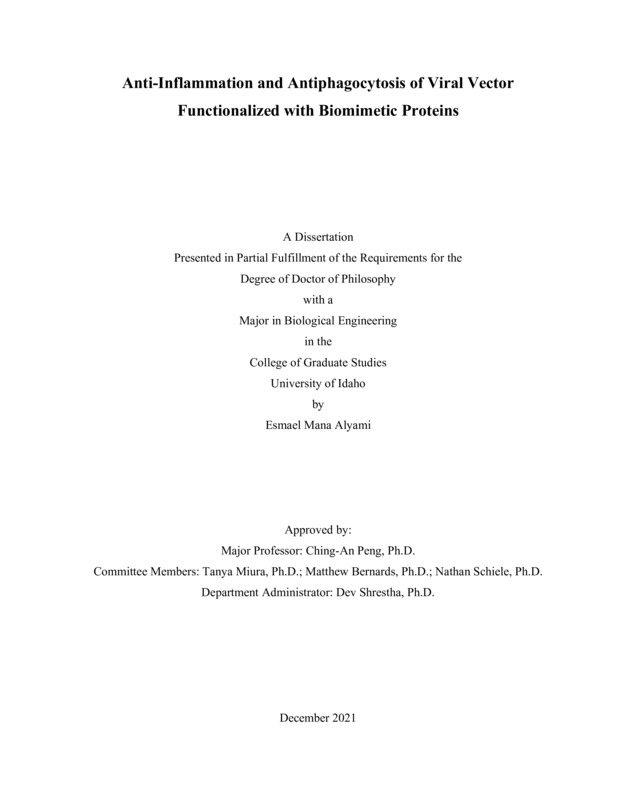Anti-Inflammation and Antiphagocytosis of Viral Vector Functionalized with Biomimetic Proteins
Alyami, Esmael Mana. (2021-12). Anti-Inflammation and Antiphagocytosis of Viral Vector Functionalized with Biomimetic Proteins. Theses and Dissertations Collection, University of Idaho Library Digital Collections. https://www.lib.uidaho.edu/digital/etd/items/alyami_idaho_0089e_12199.html
- Title:
- Anti-Inflammation and Antiphagocytosis of Viral Vector Functionalized with Biomimetic Proteins
- Author:
- Alyami, Esmael Mana
- ORCID:
- 0000-0003-3496-3684
- Date:
- 2021-12
- Embargo Remove Date:
- 2023-12-21
- Program:
- Chemical and Materials Science Engineering
- Subject Category:
- Biomedical engineering
- Abstract:
-
Gene therapy is a clinical technique that involves transferring specific genes to treat or prevent diseases. This process requires a vector to deliver the gene of interest to the target cells. While there are several carriers that can deliver the gene, modified viral vectors represent an efficient approach. However, the immune system’s recognition of viral vectors as foreign bodies remains an obstacle. In this study, we used lentiviruses as the model viral vectors and masqueraded them with biomimetic proteins CD47 and CD200 to escape immunosurveillance. CD47 is a protein that reduces phagocytic activity by interacting with its receptor SIRPα (signal-regulatory protein α) on the macrophage surface. Lentiviral vectors tethered with the CD47 protein could have the ability to prolong their circulation in the blood by diminishing macrophage-mediated phagocytic clearance via CD47-SIRPα interactions, thereby facilitating gene delivery to the target sites. CD200, known as an anti-inflammatory transmembrane glycoprotein in the immunoglobin superfamily, interacts with its receptor CD200R, which is highly expressed on myeloid cells such as macrophages and neutrophils. Lentiviral vectors capped with CD200 protein are expected to reduce macrophage activation and chronic inflammation via the CD200-CD200R interaction. To achieve the goal of using these proteins in conjunction with the viral vector as a means of escaping immunosurveillance, the core-streptavidin (coreSA) gene was first cloned and engineered into a pET-30a(+) plasmid to obtain pET-30a(+)-coreSA plasmid. Then, the extracellular domain of CD47, CD200, or CD200-CD47 genes were cloned and constructed separately into the constructed pET30a-coreSA. The CD47-coreSA, CD200-coreSA and CD200-CD47-coreSA fusion proteins were expressed by IPTG induction and purified by immobilized metal affinity chromatography. The expression and purification of all fusion proteins were visualized with a clear band in the target region by SDS-PAGE and Western blot analysis. Biotinylated lentivirus was bound to the fusion proteins through coreSA-biotin interaction, which were functionalized with CD47, CD200 and CD47-CD200-coreSA fusion proteins and then loaded onto macrophages to explore the potential use of these biomimetic nanocarriers for gene delivery. Unmodified and nonbiotinylated lentivirus vectors were evaluated as controls. Our results showed that our modified viral vectors decreased phagocytosis activities of macrophages, with effectiveness increasing with viral vectors decorated with CD200, CD47, or CD47-CD200 proteins in ascending order. In conclusion, surface modification of lentivirus vectors, especially with the CD47-CD200 fusion protein, can potentially be used in therapeutic particle delivery in order to evade immune surveillance and enhance gene delivery efficiency.
- Description:
- doctoral, Ph.D., Chemical and Materials Science Engineering -- University of Idaho - College of Graduate Studies, 2021-12
- Major Professor:
- Peng, Ching-An
- Committee:
- Miura, Tanya; Bernards, Matthew; Schiele, Nathan; Shrestha, Dev
- Defense Date:
- 2021-12
- Identifier:
- Alyami_idaho_0089E_12199
- Type:
- Text
- Format Original:
- Format:
- application/pdf
- Rights:
- In Copyright - Educational Use Permitted. For more information, please contact University of Idaho Library Special Collections and Archives Department at libspec@uidaho.edu.
- Standardized Rights:
- http://rightsstatements.org/vocab/InC-EDU/1.0/

